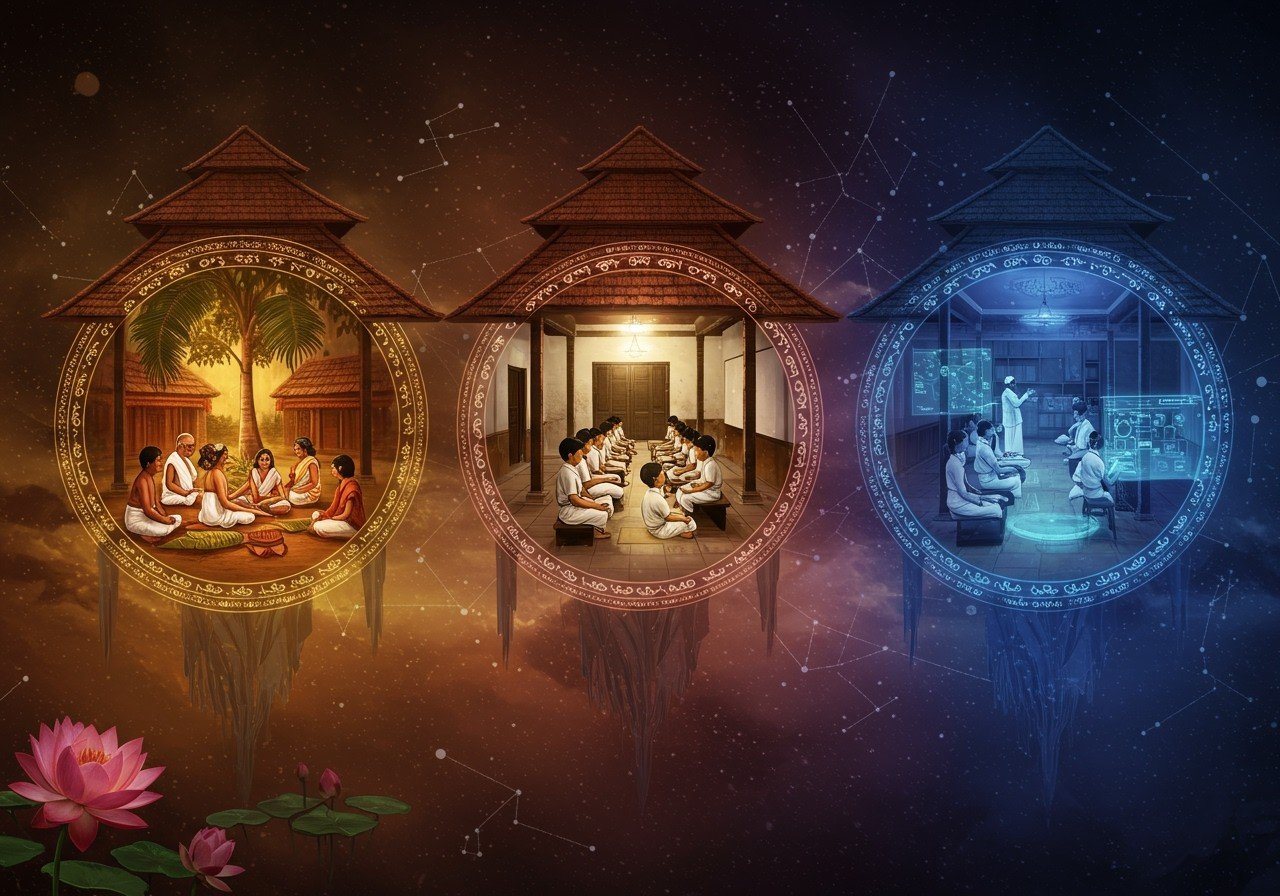
Kerala’s education system is a captivating blend of ancient wisdom and modern advancements. Deeply rooted in history, it reflects the cultural ethos and progress of the region over centuries. This system has been instrumental in Kerala’s socio-economic growth, shaping the very identity and advancement of its people. This blog post delves into the evolution of education in Kerala, from its ancient roots to its current standing, offering a glimpse into its cultural significance and future trajectory.
The Dawn of Learning: Ancient Education in Kerala
Kerala’s early educational practices were intricately woven with cultural and religious threads. During the Sangam period, learning transcended mere academics; it was a holistic approach to life itself. The Gurukulam system, where pupils resided with their gurus (teachers), fostered a deep connection between the learner and the learned. This traditional schooling emphasized not just knowledge, but also moral and spiritual development. Imagine young minds absorbing wisdom directly from their gurus, amidst the serene backdrop of nature, growing not only intellectually but also ethically.
Temples and monasteries served as vibrant hubs of learning, offering teachings in diverse subjects like philosophy, astronomy, and literature. Ancient scholars, through their profound texts, enriched Kerala’s intellectual heritage significantly. Ayurveda, the traditional system of medicine, held a prominent place, underscoring the importance of health and well-being in the pursuit of knowledge. This holistic approach nurtured well-rounded individuals, equipped with both knowledge and wisdom.
These rich traditions laid a strong foundation for future educational developments, influencing both pedagogical practices and the cultural identity of Kerala. They instilled values that continue to resonate even today, shaping the character of the people.
The Winds of Change: Colonial Influence and Modernization
The colonial era ushered in significant transformations in Kerala’s education system. The introduction of Western education reshaped the educational landscape, bringing new perspectives and methodologies. Missionary schools, such as those established by the Church Missionary Society (CMS), became instrumental in spreading Western education, particularly English language instruction.
Social reformers, visionaries like Sree Narayana Guru, championed the cause of education for all, irrespective of caste or creed. They empowered communities to establish their own schools, breaking down social barriers and promoting inclusivity. The Raja of Travancore lent his support to these initiatives, solidifying the foundations of modern education. This period marked a crucial step towards making education accessible to every child, regardless of their background.
The establishment of institutions like CMS College Kottayam in 1815, one of India’s first colleges, marked a milestone in higher education. Other prominent institutions like Zamorin’s Guruvayurappan College (1879) followed suit, expanding access to higher learning in the region. This expansion opened doors to advanced studies for countless aspiring scholars.
A New Dawn: Post-Independence Developments
Post-independence, Kerala’s education system witnessed rapid and transformative growth. The state government prioritized universal literacy and implemented reforms to achieve this goal. Free and compulsory education policies were introduced, ensuring that every child had the opportunity to learn. These dedicated efforts resulted in Kerala achieving remarkably high literacy rates, setting an inspiring example for other states to emulate.
The Kerala Education Act of 1958 aimed to streamline the organization and development of educational institutions. The government committed to funding both government-run and aided schools, ensuring quality education across the state. This commitment ensured that all children, regardless of their location or background, had access to quality education.
Universities played a crucial role in advancing higher education. The University of Travancore, founded in 1937 (later becoming the University of Kerala), and Calicut University, established in 1968, significantly expanded opportunities for higher learning and research. These institutions became centers of academic excellence, nurturing future generations of scholars and professionals.
Education in the Present Day: Contemporary Trends
Kerala’s current education system is a testament to its rich heritage and progressive outlook. It boasts high literacy rates and focuses on skill development and vocational training. This ensures students are prepared for the demands of a modern and ever-evolving economy, empowering them to contribute meaningfully to society.
Technology has become an integral part of the learning experience. Digital education initiatives have made education more accessible and engaging, bridging geographical barriers and enhancing the learning process. While there are ongoing efforts to address disparities in access and quality, the state remains dedicated to improving its educational landscape.
Both private and public institutions play vital roles in shaping the educational landscape of Kerala. The emphasis on preserving cultural heritage through the integration of arts and crafts into the curriculum reflects the state’s commitment to nurturing well-rounded individuals. This harmonious blend of tradition and modernity ensures that students receive a holistic education.
Kerala’s Education: A Cultural Perspective
Kerala’s education system is deeply intertwined with its cultural values. Malayalam, the state language, serves as the primary medium of instruction, preserving linguistic identity and promoting cultural continuity. Arts, music, and traditional crafts are integral parts of the curriculum, enriching the learning experience and nurturing creativity.
Cultural festivals, often associated with educational milestones, foster community involvement and celebrate academic achievements. They reinforce the significance of education in shaping cultural identity and strengthening social bonds. This unique fusion of tradition and modernity sets Kerala’s education system apart. It’s not just about acquiring knowledge, but also about celebrating learning as a community.
Poojn.in: Supporting Kerala’s Educational Traditions
At poojn.in, we deeply appreciate the rich cultural heritage of Kerala’s educational traditions. We offer a wide selection of authentic puja items essential for various academic ceremonies and rituals, allowing you to honor these traditions with utmost reverence.
Whether you need materials for Vidyarambham (the initiation into learning), items for Saraswati Puja (honoring the goddess of knowledge), or traditional lamps (Nilavilakku) for ceremonies, poojn.in has you covered. We also offer a variety of pure copper and brass items, sacred threads, and malas, all crafted with meticulous attention to detail and quality.
Our offerings cater to both traditional Gurukulam practices and the needs of modern educational institutions across Kerala. Students, teachers, and families can conveniently order these items online, ensuring the authenticity of ancient customs while enjoying the convenience of modern shopping.
We understand the significance of these items in Kerala’s educational landscape. That’s why we offer bulk ordering options with pan-India delivery, ensuring educational institutions can easily access the items they need for their ceremonies. Our dedicated team is also available to assist you in selecting the right items based on specific regional traditions and requirements.
To order ritual items for educational ceremonies:
- Visit: www.poojn.in. We offer a user-friendly online experience where you can browse and order from our extensive collection.
- Call us at 03369029784. Our knowledgeable customer service team is ready to answer your queries and guide you through the ordering process.
- WhatsApp us at 9476142738. Connect with us instantly for quick assistance and personalized recommendations.
All our products come with quality assurance and are carefully packaged to maintain their sanctity. We recognize the profound significance of these items in Kerala’s educational heritage and strive to ensure they meet the highest standards of purity and authenticity.
Kerala’s Educational Legacy: A Beacon of Progress
Kerala’s education system stands as a shining example of a harmonious blend of tradition and progress. From ancient Gurukuls to modern universities, the journey reflects a deep reverence for heritage and a continuous embrace of innovation. While colonial influences introduced Western educational models, social reformers and visionaries tirelessly worked to expand access to education for all, irrespective of background. Post-independence, the state’s commitment to universal literacy and quality education has led to remarkable achievements.
Today, the focus on vocational training, skill development, and the integration of technology equips Kerala’s students for a bright future. The unwavering commitment to cultural preservation, evident in the emphasis on language and the arts, underscores the state’s unique approach to education. Kerala’s education system serves as a beacon of socio-economic growth and a powerful symbol of cultural identity, inspiring generations to come.
FAQs on Kerala’s Education System: A Historical Perspective
Many people wonder about the historical journey of education in Kerala. Here are some commonly asked questions:
What defines the historical trajectory of Kerala’s education system? Kerala’s educational history is a rich tapestry woven with threads of ancient wisdom, colonial influences, and post-independence reforms. It’s a journey from traditional Gurukuls to modern universities, reflecting a constant adaptation to changing times while preserving cultural values.
How was education imparted in ancient Kerala? In ancient Kerala, education was a holistic experience, often centered around Gurukuls. Students lived with their teachers, imbibing not only academic knowledge but also moral and spiritual values. This immersive approach fostered a deep connection between the guru and shishya (student).
What was the impact of colonial rule on Kerala’s education? The colonial era brought Western-style education to Kerala, introducing English as a medium of instruction and new pedagogical approaches. This period marked a shift towards modern schooling, laying the groundwork for future developments.
How did the educational landscape change after India’s independence? Post-independence, Kerala prioritized education for all. The introduction of free and compulsory education policies led to significant improvements in literacy rates, making Kerala a model for other states.
What is the significance of Kerala University in the state’s education history? Established in 1937, Kerala University played a pivotal role in advancing higher education. It expanded access to higher learning and research, contributing significantly to the state’s intellectual growth.
How has Kerala’s education system evolved in recent decades? In recent years, Kerala’s education system has increasingly embraced technology. Digital learning platforms and online resources have enhanced access to education and created more engaging learning experiences.
What are the key factors that contribute to Kerala’s educational success? Kerala’s educational achievements are attributed to a number of factors, including high literacy rates, equitable access for all, a focus on quality education, and a strong commitment to cultural preservation. The state’s dedication to continuous improvement has been instrumental in its success.
What are some of the challenges facing Kerala’s education system today? Despite its many successes, Kerala’s education system faces ongoing challenges, including addressing disparities in access and quality, ensuring adequate infrastructure, and updating curriculum to meet global standards.


